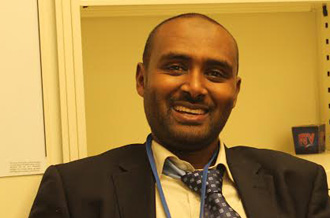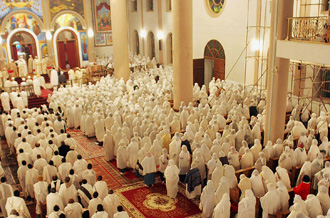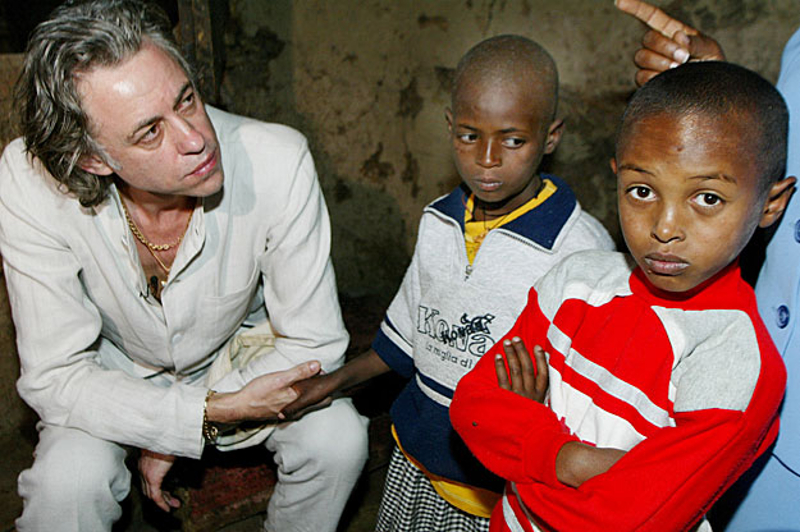Bob Geldof may well be the only writer of one of the worst-known songs of all time to admit that his multimillion selling anthem is truly awful and that he now finds himself irritated when he hears it on the radio.
“I am responsible for two of the worst songs in history,” the Irish singer and activist said in 2010. “One is ‘Do They Know It’s Christmas?’ and the other one is ‘We Are The World’.”
When it was announced last week that, in response to Ebola, Bob Geldof was planning to record a song he thinks is terrible for the fourth time, there was an eruption of criticism from Africans on Twitter and elsewhere.
Though the original was recorded to raise money for Ethiopia, African critics say the stigma its simplistic message left behind affected not only that country, but a continent of 54 hugely-varied nations.
Detractors say an unintended legacy hinders investment, hurts tourism and inspires the sort of aid that has a negative impact.
There are, of course, also Africans who have no problem with it – any initiative that raises money to respond to an underfunded disaster is welcome, they say. Questions about dignity can be debated later. The money raised by One Direction, Coldplay, Bono, Ed Sheeran and others is as welcome as anybody else’s.
But, with the power of celebrity hogging the media coverage, critical voices from the continent itself can often find themselves drowned out. So Aljazeera spoke to them to find out why they don’t want this sort of help.
The first question we asked, with tongue firmly in cheek, was the one Geldof has wondered aloud through the power of song several times over the last 30 years: Whether or not they know of a thing called Christmas?
These are their responses.
[dropcap]A[/dropcap]bdullahi Halakhe, 33, policy analyst, Kenya
Do you know it’s Christmas?
According to some estimates, the Christian population in Nigeria alone is almost three times the number of Christians in England and Wales. How couldn’t they know it’s Christmas? Bishop Arinze from Nigeria was at one point even in the running to be the next Pope.
Just sample the grotesque tone of the lyrics, dripping with the “White Man’s Burden.” It was awful 30 years ago, and it’s awful today. If they wanted a spike in record sales because we are nearing Christmas, this was not a great move.
What do you think of Western charity songs like this as a response to African emergencies?

I think the fundamental problem with the “saving” Africa posture is that it is predicated on the notion that Africa/Africans are agency-less, which for me is problematic because it is the continuation of never-ending paternalistic tendencies towards Africa.
Also, the idea that Africa needs to be saved in 2014 by washed up C-list pop artists is a perverse example of a messiah complex.
For instance, Nigeria and Senegal had outbreaks of Ebola, and they dealt with them effectively. DR Congo has had a couple of Ebola outbreaks, and they’ve dealt with them. But this is hardly mentioned in the hysteria-fuelled reportage about Ebola. Don’t get me wrong; in the three worst affected countries the impact of Ebola has been devastating. But I’d be hard pressed to think a Geldof-led charity song is the way to address it.
[dropcap]R[/dropcap]obtel Neajai Pailey, 32, PhD researcher, Liberia
Do you know it’s Christmas?
I was two years old when this phrase actually signified something. It baffles me that this old relic is being conjured up again in the 21st century. It was offensive then, and it remains offensive now. It would be best to leave it where it belongs: in the dustbins of history.
What do you think of Western charity songs like this as a response to African emergencies?

Western charity songs like the one being proposed by Geldof are not only patronising, they’re redundant and unoriginal. Producing an Ebola song now to raise money, nearly one year after the first reported case in Guinea, is belated at best. It reeks of the “white saviour complex” because it negates local efforts that have come before it.
Ebola-related songs have already been written and produced by African artists themselves, so what’s the point of reinventing the wheel?
In May, Liberian musicians Samuel ‘Shadow’ Morgan and Edwin ‘D-12’ Tweh wrote and produced ‘Ebola in Town’. The lyrics were informative and the percussive beats so hot that it became an immediate hit.
And just last month, the song ‘Africa Stop Ebola’ was produced by Malian, Ivorian, Congolese, and Guinean musicians.
We got this, Geldof, so back off. If you really want to help, buy a gazillion CDs of the two songs and send them to your friends as stocking stuffers with a note that says: “African solutions to African problems”. Instead of trying to remain relevant, Geldof and co. would do well to acknowledge the ingenuity of local artists and stop trying to steal the limelight!
[dropcap]D[/dropcap]awit Gebreselassie, 26, financial analyst, Ethiopia
Do you know it’s Christmas?
I would ask does Geldof know when it’s Christmas time in Ethiopia? As perhaps the fact that we celebrate Christmas a few weeks later on the 7th of January could have misled him into thinking we don’t know when it is. Reassure him from us that, after his last three reminders, we are well aware and don’t need any more prompting.
What do you think of Western charity songs like this as a response to African emergencies?

I think such celebrity-led initiatives have come to do more harm than the “good” they were intended for. And, even worse, is that it’s hard to imagine that the people behind it do not see the harm they are doing.
Ethiopia has for the last few years been trying extremely hard to change its image as a poster child for poverty. It has been trying to depict a new bright image to the world so as to attract tourists and foreign direct investment. But this uphill battle is always hindered when such reminders of the past appear again on the screens of the people that are trying to be persuaded.
Africa’s only hope of success against poverty is through sustained, structured and equitable economic growth brought about through things such as investment and tourism. It’s hard to imagine how a few dollars raised every so often can possibly outweigh the damage it does by blemishing the continent’s image.
[dropcap]H[/dropcap]adiyya Mwapachu, 30, student, Tanzania
Do you know it’s Christmas?
Christmas coincides with the high tourist season. If you travel during this period within Tanzania, the pilot will clamour to present the best views of Mount Kilimanjaro’s snow-capped peaks. This sight must be bewildering to everyone who knows the lyric: “And there won’t be snow in Africa this Christmas time”.
Geldof said the lyrics will be changed for the current version. Will the revisions account for how the holiday’s commercialism also exists within the continent, albeit with far less spectacle? The image of Africans buying each other presents and celebrating with large spreads of food directly contradicts the ultimate gift of all, that of aid being brought in by the wisemen.
What do you think of Western charity songs like this as a response to African emergencies?

The oft-quoted observation by Marx that “history repeats itself, first as tragedy, second as farce” applies here for both its acuteness and how it has become a cliche. The Band Aid songs reflect this pattern. They begin as an attempt to respond to catastrophe and then excise all historical context and specificity.
The meaning that remains is that one should help as “well tonight, thank God it’s them instead of you”. This erases the history of state actions in fostering armed conflict and the deliberate displacement of civilians. The 1984 and 1989 Ethiopia famine relief editions did not recognise this history. The genocide in South Sudan was also absent in the 2004 version to raise money for Darfur.
So you have messages that are interchangeable, where each emergency is met with lyrics that already fit.
Western complicity within global relations of power is also unmentioned. There is a movement underway in Guinea that uses popular culture, traditional art forms and the radio to deconstruct stigma and raise awareness about Ebola. There are similar projects in Liberia and Nigeria. These efforts are the transformative ones.
[dropcap]C[/dropcap]hitra Nagarajan, 31, human rights activist, Nigeria
Do you know it’s Christmas?
Well, self-important celebrities are getting together to do a charity single latching on to the issue of the day to raise money for “those poor people over there” so I guess it must be. But given everyone I know is thinking and talking about politics and forthcoming elections in Nigeria, or the latest fight on Twitter, Christmas seems very far away.
What do you think of Western charity songs like this as a response to African emergencies?

It’s yet another classic sign of white Western saviourism, in this case with celebrities swooping in to “save” the people of Africa. Not only does this take away the agency of people living in African countries who are the ones who actually lead and make change happen, but it perpetuates stereotypes of conflict, poverty and disease as the single story of the continent.
This is likely to exacerbate the discrimination of Africans as potential Ebola-carriers that we have already seen. It is also a manifestation of increasing celebritisation whereby every possible topic has a famous musician or actor attached who become “experts” listened to at the expense of the actual people whose lives are affected. Darfur has George Clooney. Ending poverty has Bono. Now Ebola has Bob Geldof. Research shows that it’s the celebrities and their image not the causes that benefit the most.
If the purpose of Bob Geldof and others is really to help the Ebola response rather than burnish their own profiles as modern day saints, they would donate money behind the scenes. The money that will be raised through this Ebola single could easily be raised by these rich musicians having a whip round among themselves and their friends.











Who is Bob Geldof? I think C-list is a little generous.
Who is Bob Geldof again?
I have never in my entire African life heard about this man’s songs. Those who listen to his songs think and indulge too much into western culture.
I care less what this man and his entourage of idiotic singers do in the west. I care so much less. All I care about is what we are doing in Africa so solve and resolve our issues and differences. Maybe if we stopped listening to their idiotic songs and stopped watching their arrogant tv stations we wouldn’t have people like Geldof to deal with.